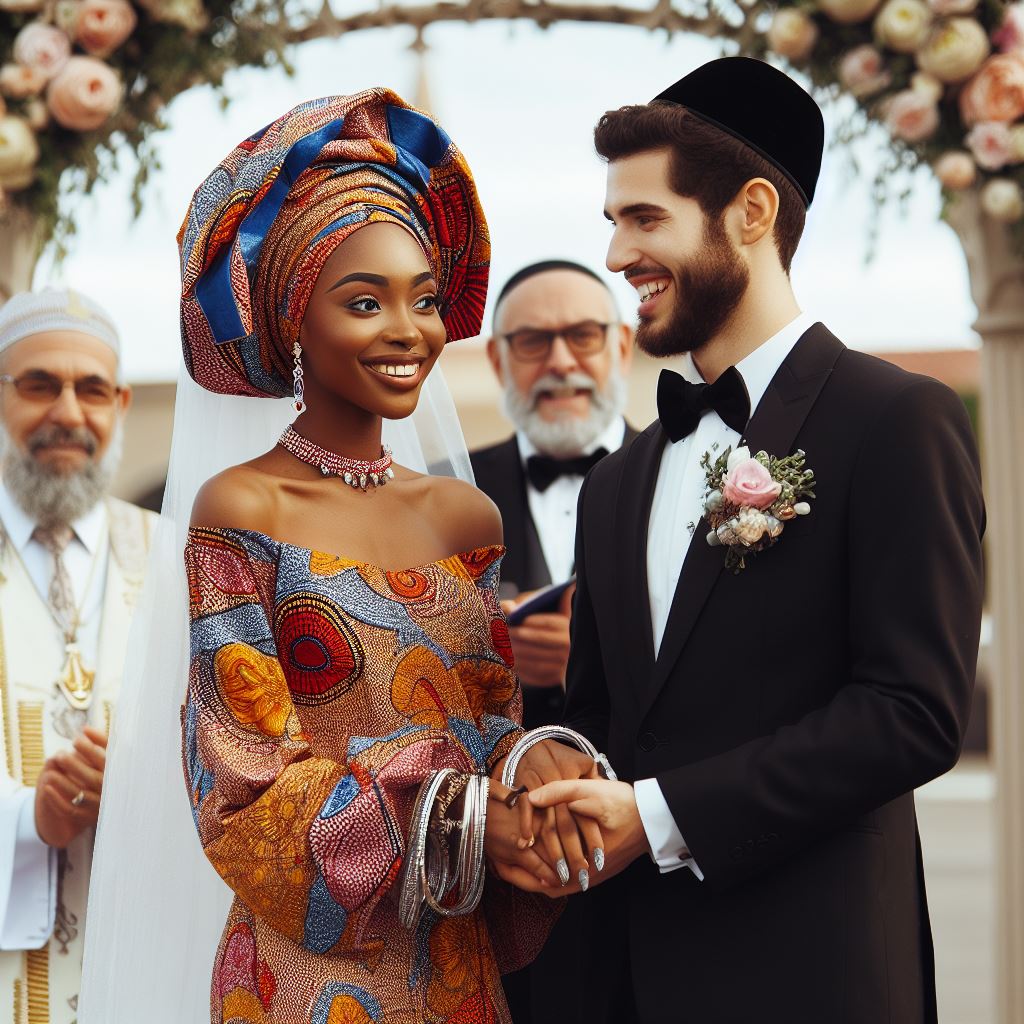Challenges of Interfaith Marriages: Islamic Views & Nigeria
Last Updated on October 14, 2023
Introduction
Interfaith marriages refer to unions between individuals from different religious backgrounds.
It is essential to discuss the Islamic perspective on interfaith marriages in Nigeria due to its prevalence and significance in the country.
In Nigeria, where Islam is a dominant religion, interfaith marriages pose unique challenges for individuals involved.
Islamic views on these unions often vary, leading to potential complications and conflicts.
By addressing the Islamic views on interfaith marriages in Nigeria, we can gain a better understanding of the hurdles faced by individuals in these relationships.
This blog post aims to shed light on these challenges and how they can be overcome.
Throughout this blog series, we will explore various aspects of interfaith marriages from an Islamic perspective, focusing specifically on Nigeria.
By delving into the religious beliefs and social dynamics surrounding these unions, we can promote understanding and foster dialogue.
It is crucial to engage in meaningful discussions about interfaith marriages in Nigeria to bridge the gap between different religious communities and promote mutual respect.
By highlighting the challenges and exploring potential solutions, we can work towards a more inclusive society that embraces diversity.
Join us in this journey as we unravel the complexities of interfaith marriages in Nigeria through an Islamic lens and strive for a harmonious coexistence.
Definition of Interfaith Marriages
What interfaith marriages entail
Interfaith marriages refer to unions between individuals of different religious backgrounds.
In these marriages, couples may come from diverse belief systems, such as Islam, Christianity, Hinduism, or Buddhism.
Statistics on the prevalence of interfaith marriages in Nigeria
- According to a study conducted by the Pew Research Center, Nigeria has a significant number of interfaith marriages.
- The study revealed that around 30% of Nigerian marriages are interfaith, indicating a high rate compared to other countries.
- This prevalence can be attributed to Nigeria’s multi-religious society, with Islam and Christianity being the two major religions.
- In Nigeria, interfaith marriages are often seen between Muslims and Christians, given the large population of both religions in the country.
- These marriages have become more common over the years as people are increasingly open to bridging religious divides in their personal relationships.
Now that we understand what interfaith marriages are and their prevalence in Nigeria, let us delve into the challenges faced by individuals in such unions, particularly from an Islamic perspective.
Challenges of Interfaith Marriages: Islamic Views & Nigeria
Interfaith marriages pose unique challenges, as they involve navigating differences in religious beliefs, practices, and cultural backgrounds.
In an Islamic context, the challenges can be more pronounced due to the specific requirements and teachings of the religion.
- Interfaith marriages may create a clash of values, as Islam encourages Muslim spouses to prioritize their faith.
- Islamic teachings emphasize the importance of shared religious beliefs, as they form the foundation of a harmonious marital relationship.
- Difference in rituals and practices, such as dietary restrictions or prayer routines, can lead to conflicts if not addressed through open communication and mutual understanding.
- Raising children in an interfaith household can be another challenge. Both parents may desire to instill their own religious values, leading to potential confusion for the children.
- Social backlash and cultural issues can also arise in interfaith marriages, particularly in Nigeria. Community expectations and pressure can affect the couple’s relationship and their interactions with extended families.
- Legal complexities may arise when couples have different legal frameworks governing their respective religious marriages.
- Religious conversion is often seen as a potential solution in Islamic views, as it aligns with the Islamic principle of Muslim men marrying women from “People of the Book” (Jews and Christians). However, this may not always be a feasible or desirable option for both partners.
Potential solutions to challenges
Despite these challenges, interfaith marriages can succeed if the couple is committed to mutual respect, open dialogue, and a shared willingness to navigate the complexities that arise from their religious differences.
It is essential for couples in interfaith marriages to seek guidance from religious leaders who can provide them with appropriate insights and advice grounded in their respective faiths, such as imams or pastors.
Basically, interfaith marriages in Nigeria carry specific challenges from an Islamic perspective.
While it is crucial to acknowledge these challenges, it is equally important to recognize that with understanding, compromise, and sincere efforts, couples can build healthy, long-lasting relationships that transcend religious boundaries.
By fostering respect, open-mindedness, and empathy, interfaith marriages can contribute to a society that promotes religious harmony and tolerance, values cherished by both Islam and Nigeria.
Read: The Concept of Polygamy in Islam: Nigerian Perspectives
Islamic Views on Interfaith Marriages
Overview of the Islamic perspective on marriage
In Islam, marriage is considered a sacred bond between a man and a woman.
It is a means of forming a family and fulfilling one’s religious duty.
The purpose of marriage is to attain love, companionship, and procreation.
Islam emphasizes the importance of mutual respect, understanding, and support in a marriage.
Islamic teachings regarding interfaith marriages
1. Quranic references and verses
The Quran discourages Muslim men from marrying women who are polytheists.
It encourages Muslim women to marry believing men or men from the People of the Book.
Verse 2:221 states, “And do not marry polytheistic women until they believe.”
Interpretations suggest that this verse is applicable to both men and women in interfaith marriages.
2. Hadiths and teachings of Prophet Muhammad
Prophet Muhammad encouraged Muslims to marry individuals who are religiously compatible.
He advised against marrying people from different faiths to maintain family harmony.
The Prophet emphasized the importance of sharing similar values and beliefs in a marriage.
Hadiths also suggest that interfaith marriages can lead to challenges and conflicts in the household.
3. Scholarly interpretations and opinions
Islamic scholars hold different opinions regarding interfaith marriages.
Some scholars prohibit them, citing the potential for religious conflicts and difficulties in raising children.
Other scholars permit interfaith marriages under certain conditions, such as the preservation of Islamic values.
They stress the need for open communication, mutual respect, and shared religious practices in such marriages.
Generally, Islamic teachings emphasize the importance of compatibility and shared beliefs in marriage.
While interfaith marriages present challenges, they can be successfully navigated with understanding and commitment.
Read: Celebrating Walimah: The Sunnah of Islamic Wedding Feast
Challenges Faced in Interfaith Marriages
Interfaith marriages face numerous challenges, primarily stemming from cultural and religious differences.
These challenges can strain the relationship, leading to conflicts and potential difficulties in finding mutual understanding.
Cultural and religious differences
- Traditional practices and rituals: The clash between different cultural and religious traditions can create conflicts and misunderstandings.
- Dietary restrictions and preferences: Differences in dietary habits, such as whether one partner follows halal or kosher dietary laws, can cause challenges.
- Celebrations and religious holidays: Conflicting expectations regarding celebrations and religious holidays may lead to disagreements and emotional strain.
Family and community pressures
- Acceptance and support from extended family members: Interfaith couples may face resistance or lack of acceptance from their respective extended families, making it difficult to receive support.
- Social stigma and judgment from society: Society’s disapproval and judgment towards interfaith marriages can contribute to stress and strain on the relationship.
- Influence of religious leaders and community leaders: Religious leaders and community leaders may discourage interfaith marriages, causing external pressure on the couple.
Cultural and religious differences
Traditional practices and rituals
One of the primary challenges faced in interfaith marriages is the clash of traditional practices and rituals.
Different cultural and religious traditions often have distinct customs and rituals for various life events, such as weddings, births, and funerals.
These differences can lead to conflicts and misunderstandings if not addressed and accommodated by both partners.
Dietary restrictions and preferences
Another challenge arises from dietary restrictions and preferences.
For example, one partner following halal dietary laws while the other prefers non-halal food can create tension and difficulties in shared meals.
Negotiating and finding a compromise that respects both partners’ beliefs and values is crucial in maintaining harmony in the relationship.
Celebrations and religious holidays
Celebrations and religious holidays can also pose challenges.
Each partner might have different expectations regarding how to celebrate these occasions, which can result in disagreements and emotional strain.
Couples must communicate openly and find ways to respect and incorporate each other’s traditions into their shared celebrations.
Family and community pressures
Acceptance and support from extended family members
Family and community pressures can significantly affect interfaith marriages.
Extended family members may struggle to accept or support the relationship due to their own religious or cultural biases.
This lack of support can strain the bond between partners, making it essential to address these concerns and work towards mutual understanding and acceptance.
Social stigma and judgment from society
Furthermore, interfaith couples often face social stigma and judgment from wider society.
Prejudice and disapproval can generate added stress and strain on the relationship.
It is vital for the couple to develop a resilient mindset and find support from like-minded individuals or communities who embrace diversity.
Influence of religious leaders and community leaders
Religious leaders and community leaders also play a substantial role in shaping attitudes towards interfaith marriages.
Their influence can either create an accepting and inclusive environment or propagate prejudice and discourage such unions.
It is crucial for couples to find religious or community leaders who offer support and guidance, allowing them to navigate these challenges more effectively.
Generally, interfaith marriages encounter various challenges, including cultural and religious differences, as well as family and community pressures.
Successfully navigating these challenges requires open communication, respect for each partner’s beliefs, and finding support from accepting individuals and communities.
With patience, understanding, and a shared commitment to building a harmonious relationship, interfaith couples can overcome these obstacles and create a fulfilling and resilient bond.
Read: Choosing a Spouse in Islam: Criteria and Nigerian Context

Coping Strategies for Interfaith Marriages
Open and Honest Communication
- Begin by discussing your beliefs and values openly, without judgment or criticism. Share your faith’s core principles and values.
- Establish a foundation of mutual respect and understanding. Acknowledge differences and explore how they can strengthen your relationship.
Seeking Professional Counseling or Guidance
- Explore marriage counseling services, whether through secular therapists or religious counselors who specialize in interfaith relationships.
- Involve religious leaders to mediate discussions between families and communities. Their guidance can ease tensions and promote acceptance.
Embracing Compromise and Finding Common Ground
- Balance religious practices and traditions. Negotiate which customs you’ll follow and how to incorporate both faiths into your lives.
- Navigate cultural expectations by discussing how you’ll handle holidays, ceremonies, and family gatherings that may involve different customs.
Interfaith marriages in Nigeria can be challenging due to the diverse religious landscape, but these strategies can help build a strong foundation of trust and understanding.
Open communication, seeking guidance, and embracing compromise are essential for a harmonious union that respects both partners’ beliefs and cultures.
Read: Nikah Khutbah: Significance and Common Practices in Nigeria
Success Stories of Interfaith Marriages in Nigeria
Success stories of interfaith marriages in Nigeria serve as a ray of hope for couples facing similar challenges.
These examples show that it is possible to overcome religious differences and build lasting and meaningful relationships.
Examples of successful interfaith marriages
- Aisha, a Muslim woman, and John, a Christian man, have been happily married for 15 years.
- Fatima, a Hindu woman, and Ahmed, a Muslim man, have built a strong and loving relationship since their wedding.
- Chinwe, a Christian woman, and Ibrahim, a Muslim man, have navigated their cultural differences and created a harmonious home together.
Lessons learned from these marriages
- The importance of open communication and constant dialogue to address any religious conflicts that may arise.
- Understanding and respecting each other’s beliefs and practicing compromise when making important decisions.
- Building a foundation of love, trust, and mutual support to overcome challenges faced by interfaith couples.
Importance of mutual respect, tolerance, and understanding
- Interfaith marriages thrive when partners respect each other’s religious traditions and practices.
- Tolerance allows couples to approach their differences with empathy and acceptance, fostering a peaceful coexistence.
- Understanding each other’s faith promotes a deeper connection and appreciation of one’s partner.
Examples of successful interfaith marriages
One such success story is the marriage of Aisha and John.
Despite their different religious backgrounds, they have managed to create a loving and supportive partnership.
Their key to success lies in their commitment to open communication.
They regularly discuss their beliefs, practices, and any potential conflicts that may arise.
By addressing these issues head-on, they have been able to navigate their differences and find common ground.
Fatima and Ahmed’s marriage is another inspirational example.
They have embraced the values of mutual respect and compromise.
Fatima, a Hindu, has learned about Islam and has actively participated in Ahmed’s religious practices.
Similarly, Ahmed has respected Fatima’s beliefs and supported her in practicing her own religion.
Their willingness to understand each other’s faiths has strengthened their bond and fostered a deep sense of appreciation for their shared values.
Chinwe and Ibrahim’s story underscores the significance of love, trust, and mutual support.
As a Christian and a Muslim, they have had to navigate cultural differences and societal expectations.
Through their unwavering love and support for each other, they have created a harmonious home where both religions are celebrated.
Their ability to uplift and respect each other’s faith has allowed them to build a strong foundation for their family.
Lessons learned from these marriages
These success stories provide valuable lessons for interfaith couples. Firstly, open communication is crucial in addressing religious conflicts.
By discussing differences openly and honestly, couples can find common ground and create a harmonious environment.
Secondly, practicing mutual respect and compromise is essential.
Respecting each other’s beliefs and making joint decisions that honor both religions fosters a sense of equality and understanding.
Lastly, building a foundation of love, trust, and mutual support is vital to overcome challenges faced by interfaith couples.
By prioritizing their relationship and offering unwavering support, couples can navigate the complexities of interfaith marriages.
Essentially, success stories of interfaith marriages in Nigeria highlight the importance of mutual respect, tolerance, and understanding.
These stories prove that with open communication, compromise, and love, couples can overcome the challenges posed by religious differences.
By embracing each other’s faiths and building a foundation of trust and support, interfaith couples can create happy and fulfilling lives together.
Conclusion
Recap of key points discussed in the blog post
In this blog post, we have examined the challenges faced in interfaith marriages from an Islamic perspective in Nigeria.
We discussed the importance of open communication, mutual respect, and compromise in these unions.
Furthermore, we explored the issue of religious compatibility and the need for understanding and tolerance in such marriages.
Encouragement for open-mindedness and cultural acceptance
It is crucial for individuals involved in interfaith marriages to be open-minded and accepting of different cultures and beliefs.
By embracing diversity and respecting each other’s faith, couples can create a harmonious and loving environment.
Final thoughts on interfaith marriages in Nigeria
Interfaith marriages in Nigeria pose various challenges, but they are not insurmountable.
With strong commitment, love, and understanding, couples can navigate through these difficulties successfully.
It is essential to prioritize clear communication, compromise, and mutual respect in order to build a strong foundation for their relationship.
Let us remember that love knows no boundaries and transcends religious differences.
We should celebrate the harmony that interfaith marriages can bring and focus on the shared values and principles that unite us all as human beings.
By fostering a culture of acceptance and understanding, we can overcome the challenges and embrace the beauty of interfaith marriages in Nigeria.


